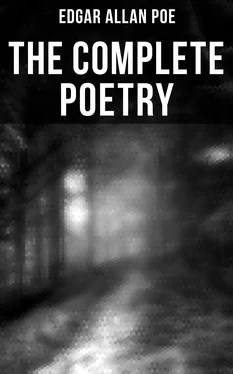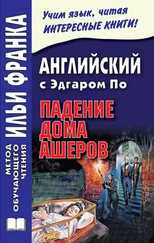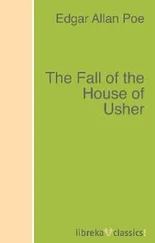Tho' loved, and loving—let it pass.—
XIV.
I went from out the matted bower,
And hurried madly on my way:
And felt, with every flying hour,
That bore me from my home, more gay;
There is of earth an agony
Which, ideal, still may be
The worst ill of mortality.
'Tis bliss, in its own reality,
Too real, to his breast who lives Not within himself but gives A portion of his willing soul To God, and to the great whole— To him, whose loving spirit will dwell With Nature, in her wild paths; tell Of her wondrous ways, and telling bless Her overpowering loveliness! A more than agony to him Whose failing sight will grow dim With its own living gaze upon That loveliness around: the sun— The blue sky—the misty light Of the pale cloud therein, whose hue Is grace to its heavenly bed of blue; Dim! tho' looking on all bright! O God! when the thoughts that may not pass Will burst upon him, and alas! For the flight on Earth to Fancy given, There are no words—unless of Heaven.
XV.
*****
Look round thee now on Samarcand,
Is she not queen of earth? her pride
Above all cities? in her hand
Their destinies? with all beside
Of glory, which the world hath known?
Stands she not proudly and alone?
And who her sovereign? Timur, he
Whom the astonish'd earth hath seen,
With victory, on victory,
Redoubling age! and more, I ween,
The Zinghis' yet re-echoing fame.
And now what has he? what! a name.
The sound of revelry by night
Comes o'er me, with the mingled voice
Of many with a breast as light,
As if 'twere not the dying hour
Of one, in whom they did rejoice—
As in a leader, haply—Power
Its venom secretly imparts;
Nothing have I with human hearts.
XVI.
When Fortune mark'd me for her own,
And my proud hopes had reach'd a throne
(It boots me not, good friar, to tell
A tale the world but knows too well,
How by what hidden deeds of might,
I clamber'd to the tottering height,)
I still was young; and well I ween
My spirit what it e'er had been.
My eyes were still on pomp and power,
My wilder'd heart was far away
In valleys of the wild Taglay,
In mine own Ada's matted bower.
I dwelt not long in Samarcand
Ere, in a peasant's lowly guise,
I sought my long-abandon'd land;
By sunset did its mountains rise
In dusky grandeur to my eyes:
But as I wander'd on the way
My heart sunk with the sun's ray.
To him, who still would gaze upon
The glory of the summer sun,
There comes, when that sun will from him part,
A sullen hopelessness of heart.
That soul will hate the evening mist
So often lovely, and will list
To the sound of the coming darkness (known
To those whose spirits hearken) as one
Who in a dream of night would fly, But cannot, from a danger nigh. What though the moon—the silvery moon— Shine on his path, in her high noon; Her smile is chilly, and her beam In that time of dreariness will seem As the portrait of one after death; A likeness taken when the breath Of young life, and the fire o' the eye, Had lately been, but had pass'd by. 'Tis thus when the lovely summer sun Of our boyhood, his course hath run: For all we live to know—is known; And all we seek to keep—hath flown; With the noon-day beauty, which is all. Let life, then, as the day-flower, fall— The transient, passionate day-flower, Withering at the evening hour.
XVII.
I reach'd my home—my home no more—
For all was flown that made it so—
I pass'd from out its mossy door,
In vacant idleness of woe.
There met me on its threshold stone
A mountain hunter, I had known
In childhood, but he knew me not.
Something he spoke of the old cot:
It had seen better days, he said;
There rose a fountain once, and there Full many a fair flower raised its head: But she who rear'd them was long dead, And in such follies had no part, What was there left me now? despair— A kingdom for a broken—heart.
Table of Contents
Sleep on, sleep on, another hour —
I would not break so calm a sleep,
To wake to sunshine and to show'r,
To smile and weep.
Sleep on, sleep on, like sculptured thing,
Majestic, beautiful art thou;
Sure seraph shields thee with his wing
And fans thy brow —
We would not deem thee child of earth,
For, O, angelic, is thy form!
But, that in heav'n thou had'st thy birth,
Where comes no storm
To mar the bright, the perfect flow'r,
But all is beautiful and still —
And golden sands proclaim the hour
Which brings no ill.
Sleep on, sleep on, some fairy dream
Perchance is woven in thy sleep —
But, O, thy spirit, calm, serene,
Must wake to weep.
Tamerlane
Table of Contents
It was my choice or chance or curse
To adopt the cause for better or worse
And with my worldly goods & wit
And soul & body worship it ----
Table of Contents
| Who hath seduced thee to this foul revolt From the pure well of Beauty undefiled? So banish from true wisdom to prefer Such squalid wit to honourable rhyme? To write? To scribble? Nonsense and no more? I will not write upon this argument To write is human -- not to write divine. |
 |
Milton Par. Lost Bk. I Somebody Cowper's Task, Book I Shakespeare do. Trolius & Cressida Pope Essay on Man |
To Miss Louise Olivia Hunter
Table of Contents
Though I turn, I fly not —
I cannot depart;
I would try, but try not
To release my heart.
And my hopes are dying
While, on dreams relying,
I am spelled by art.
Thus, the bright snake coiling
'Neath the forest tree
Wins the bird, beguiling,
To come down and see:
Like that bird the lover
Round his fate will hover
Till the blow is over
And he sinks — like me.
Table of Contents
When wit, and wine, and friends have met
And laughter crowns the festive hour
In vain I struggle to forget
Still does my heart confess thy power
And fondly turn to thee!
But Octavia, do not strive to rob
My heart of all that soothes its pain
The mournful hope that every throb
Will make it break for thee!
Table of Contents
Far away — far away —
Far away — as far at least
Lies that valley as the day
Down within the golden east —
All things lovely — are not they
Far away — far away ?
It is called the valley Nis.
And a Syriac tale there is
Thereabout which Time hath said
Shall not be interpreted.
Something about Satan's dart —
Something about angel wings —
Much about a broken heart —
All about unhappy things:
But "the valley Nis" at best
Means "the valley of unrest."
Once it smil'd a silent dell
Where the people did not dwell,
Having gone unto the wars —
And the sly, mysterious stars,
With a visage full of meaning,
O'er the unguarded flowers were leaning:
Or the sun ray dripp'd all red
Thro' the tulips overhead,
Читать дальше













